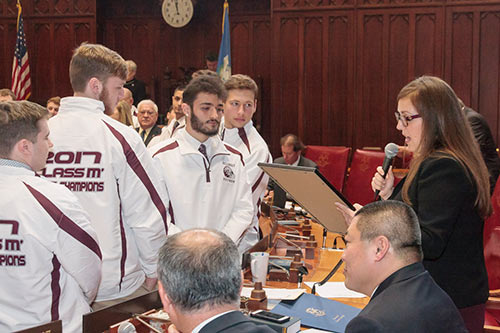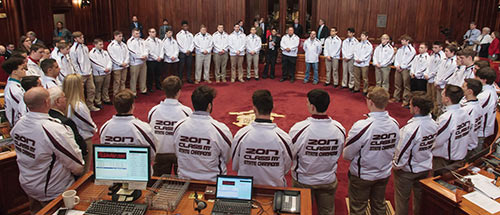Senate President Pro Tempore Looney Testifies in Support of the Time’s Up Act
Senate Democratic Proposal Seeks to Combat Sexual Harassment and Sexual Assault
Senate President Pro Tempore Martin M. Looney (D-New Haven) declared “time’s up” on sexual harassment and sexual assault in testimony today before the General Assembly’s Judiciary Committee. Senator Looney was testifying in support of the Time’s Up Act, a legislative package introduced by Senate Democrats that includes the largest overhaul in modern history of Connecticut’s sexual harassment and sexual assault laws.
“As a society, we are in the midst of a national reckoning concerning sexual harassment and sexual assault,” said Senator Looney. “We have seen sexual harassment exposed across all types of industries and have learned the heartbreaking stories of so many victims. The Time’s Up Act represents the largest overhaul of Connecticut’s sexual harassment and sexual assault laws in modern history.”
The Senate Democrats’ Time’s Up Act reforms Connecticut’s sexual harassment and sexual assault laws and processes to create stronger protections for victims and to increase penalties for offenders by:
- reforming the Connecticut Commission on Human Rights and Opportunities (CHRO) complaint process
- strengthening and expanding Connecticut’s mandated reporter laws
- eliminating statutes of limitation for all felony and Class A misdemeanor sexual assault crimes
- increasing financial penalties for offenders
- providing for injunctive relief and punitive damages
- setting a universal process for investigations of harassment complaints against school administrators, and
- requiring increased training and education in Connecticut workplaces.
“We must do all within our power to protect those who depend on us and ensure safe work environments so that no one at their place of employment ever feels exposed to discrimination, harassment or retaliation of any kind,” testified Senator Looney. “We must recognize that workplace harassment and discrimination does exist in Connecticut, and I believe we must do everything we can to eradicate and prevent it.”
The U.S. Equal Employment Opportunity Commission (EEOC) receives workplace complaints of sexual harassment, and notes that women file more than 80 percent of such complaints. Studies show that around 70 percent to 80 percent of people who experience workplace harassment do not report it. Perhaps this is for good reason, because those who do report general mistreatment at work experience retaliation 75 percent of the time.
Senator Looney continued, “Victims of harassment have rights, and the fact that they suffer more when these rights are exercised is unacceptable. Harassment undercuts hardworking individuals who deserve the same opportunities as others, and it generates real mental and economic hardship. Further, it hurts a company’s bottom line because it diminishes worker productivity and leads to staff turnover.”
During calendar year 2017, the Connecticut Commission on Human Rights and Opportunities (CHRO) processed 4,600 total complaints and received 2,490 new complaints. Of those new complaints, more than two-thirds, over 1,800, were about employment discrimination. 158 were about sexual harassment. The sexual harassment complaints are trending significantly upwards on a year over year basis, with the last three months of 2017 seeing a 37 percent increase in filed complaints over the last quarter of 2016.
The bill ensures employees are better informed of their rights. Under current law, only employers with 50 or more employees must provide training on sexual harassment, and even then only to supervisors. Under the bill, CHRO is authorized to require all employers with three or more employees to provide training to all employees, not only supervisors. The bill will prohibit an employer from taking corrective action that modifies the accuser’s employment conditions, without her or his written consent.
“Harassment undercuts hardworking individuals who deserve the same opportunities as others, and it generates real mental and economic hardship,” testified Senator Looney.
Senate Bill 132 would also eliminate the statute of limitations for rape and other sexual assault crimes
“As we listen to the #MeToo movement, we should not dismiss the accusers. Not reporting sexual assault is a common response. According to statistics by the Department of Justice, victims report these crimes less than others because they are fearful of retaliation and do not think the police will believe them. Our statute of limitations should reflect the fact that victims respond differently to sex crimes than victims of other crimes,” testified Senator Looney
Senate Bill 132 would add licensed and board certified behavior analysts to the list of professionals required to report child abuse, and this provision is consistent with SB 244, which received bipartisan support from members of the Human Services Committee. Senate Bill 132 also bill removes an exemption from the mandated reporter laws for certain day care facilities.
**Senator Looney’s testimony and a fact sheet are attached.

